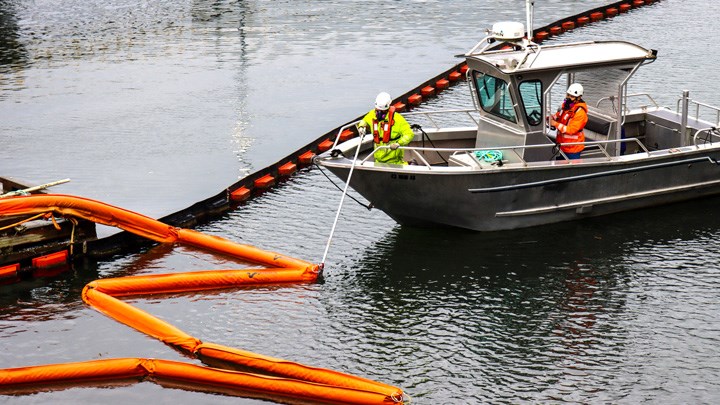Trans Mountain conducted a “full-scale emergency response exercise” on Wednesday at the Westridge Marine Terminal in Burnaby.
The goal was to demonstrate Trans Mountain’s ability to “effectively manage a spill response event should one occur in Burrard Inlet,” said a news release.
The drill included a coordinated response with more than 150 virtual and in-person participants from two Indigenous communities and 10 agencies, including the Canada Energy Regulator, Canadian Coast Guard, Transport Canada and Western Canada Marine Response Corporation.
The full-scale exercise tests response personnel to demonstrate and practise both land and water-based training, including the deployment of equipment and response vessels within Burrard Inlet at Westridge Marine Terminal.
“Our top priority is always the safety of the communities where we operate. We have adapted some of our emergency management approaches during COVID-19, including enhanced safety protocols and transitioning some functions to a virtual platform,” said Kelly Malinoski, Trans Mountain’s director of emergency management. “Our teams continually review, revise, practice our emergency response capabilities and share our plans with parties who could be involved in emergency response and with our community stakeholders.”
As a result of the ongoing COVID-19 pandemic, all participants were required to follow safety protocols. The exercise had a small in-person deployment at Westridge and a hybrid incident command post with a contingent of the team working in-person locally and a larger number of participants working remotely. Several agencies, stakeholders, first responders and regulators participated in the hybrid ICP and in the integrated response alongside Trans Mountain personnel.
Trans Mountain is required to have an emergency management program that “anticipates, prevents, manages and mitigates conditions during the unlikely event of an emergency.” Each year, it conducts more than 20 emergency response exercises, equipment deployment drills and training opportunities that are evaluated by regulatory agencies.
In early March, CER performed its first-ever unannounced exercise to test and evaluate the preparedness of the Trans Mountain pipeline expansion project in Burnaby.
CER inspectors and an Indigenous Monitor for the Indigenous Advisory and Monitoring Committee for the Trans Mountain expansion and existing pipeline arrived at the Burnaby Mountain tank farm at 4 p.m., which was designed to coincide with increased traffic volume in the area due to the afternoon rush hour, CER said in a news release.
There was no prior warning given to the company that the CER would be initiating this exercise. Trans Mountain was directed to simulate a response to a full surface crude oil tank fire, said CER.



